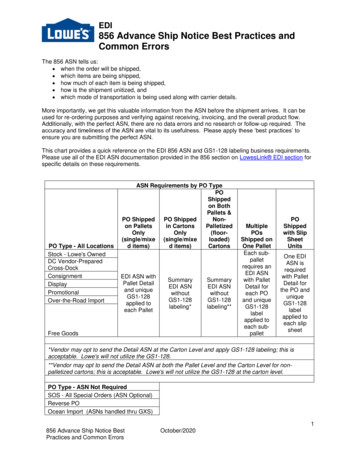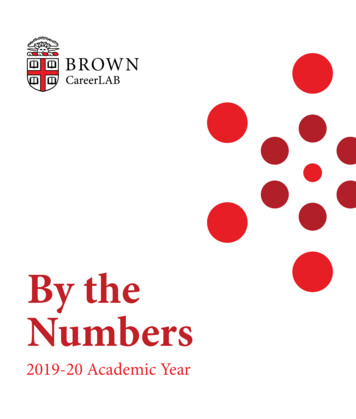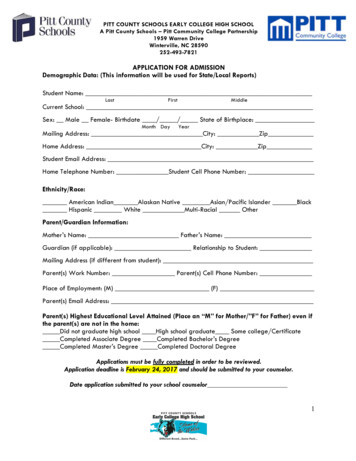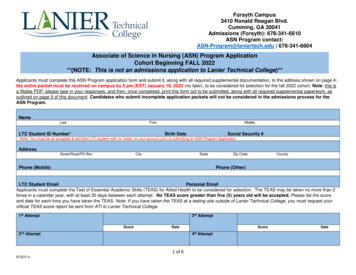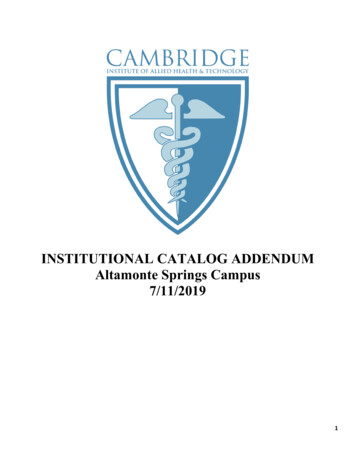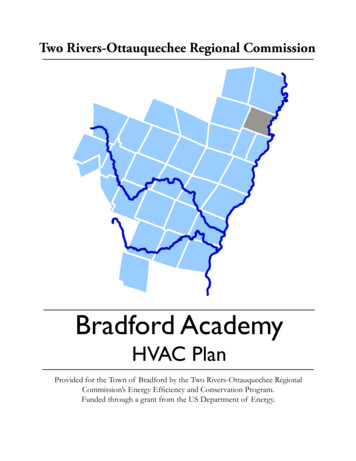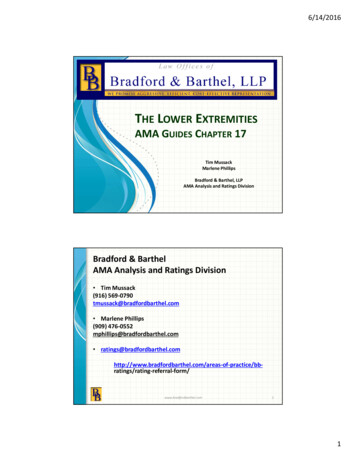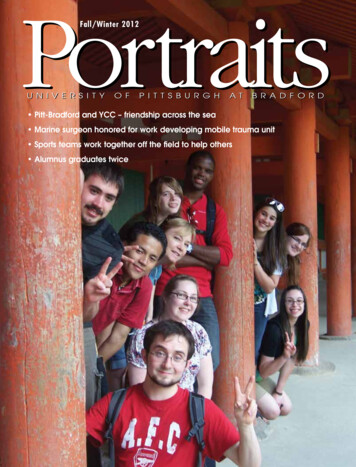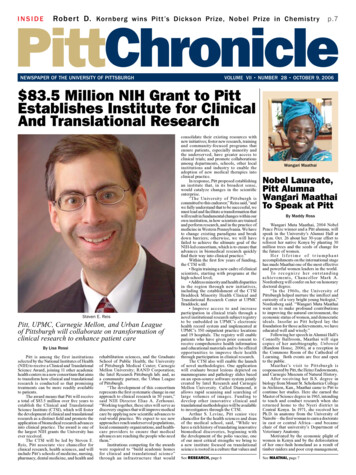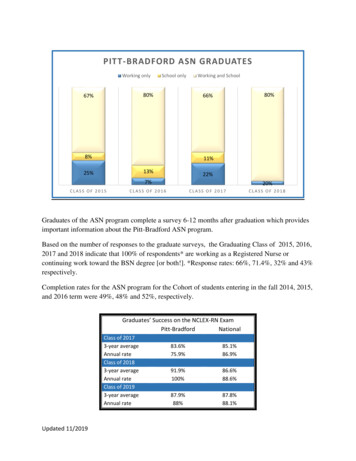
Transcription
PITT-BRADFORD ASN GRADUATESWorking onlySchool only80%67%Working and School80%66%8%11%13%25%22%7%CLASS OF 201520%CLASS OF 2016CLASS OF 2017CLASS OF 2018Graduates of the ASN program complete a survey 6-12 months after graduation which providesimportant information about the Pitt-Bradford ASN program.Based on the number of responses to the graduate surveys, the Graduating Class of 2015, 2016,2017 and 2018 indicate that 100% of respondents* are working as a Registered Nurse orcontinuing work toward the BSN degree [or both!]. *Response rates: 66%, 71.4%, 32% and 43%respectively.Completion rates for the ASN program for the Cohort of students entering in the fall 2014, 2015,and 2016 term were 49%, 48% and 52%, respectively.Graduates’ Success on the NCLEX-RN ExamPitt-BradfordNationalClass of 20173-year averageAnnual rateClass of 20183-year averageAnnual rateClass of 20193-year averageAnnual rateUpdated %88%87.8%88.1%
University of Pittsburgh at Bradford End of Program Student Learning Outcomes SurveyFACULTY RATINGS [AT GRADUATION]Rating Scale: 1 Not at all --------------- to ---------------- 5 A great dealFACULTY: ASN STUDENT LEARNING OUTCOMES1) Utilize the nursing process as a basis for decision-making in the provision of safe, holistic, costeffective quality client-centered care to meet the needs of diverse clients across the lifespan.4.92) Apply the concepts/theories assimilated from natural, social sciences, nursing and nursingresearch in the planning, prioritization, and delivery of care, teaching and health promotion fordiverse clients utilizing clinical data and literature to support decisions and evaluate outcomes ofcare.3) Establish and maintain therapeutic communication with clients, families, significant others, andhealth team members utilizing appropriate channels of communication to accomplish goals relatedto the delivery of client care.4) Demonstrate the management of care for clients in an environment that promotes clients’ values,self-esteem, dignity, safety, and comfort and supports participation by the client, family, significantothers, and members of the health care team in the plan of care while maintaining accountability forindividual nursing practice.5) Demonstrate a spirit of inquiry through participation in learning activities to maintain safepractice, advance quality care, foster critical thinking and promote the profession of nursing.6) Utilize current technology effectively and efficiently to manage and deliver safe, quality care fordiverse clients within the structured care setting.7) Demonstrate decision-making and purposeful actions that are consistent with the standards ofnursing practice and within the ethical and legal framework of nursing.FACULTY: BSN STUDENT LEARNING OUTCOME1) Utilize the nursing process as a basis for decision-making in the provision of safe, holistic,quality client-centered care to meet the needs of diverse individuals, families, and the community2) Synthesize and integrate the concepts/theories assimilated from natural, social sciences, nursingand nursing research in the planning, prioritization, and delivery of safe quality care and healthpromotion for diverse patients, families and communities utilizing clinical data and literature tosupport decisions and evaluate outcomes of care3) Utilize appropriate communication techniques and group process skills in collaborating withindividuals, families, community and the health care team while demonstrating a self-awareness ofpotential barriers to communication in diverse patient settings4) Integrate and utilize theories of leadership and management in working with, health care team,individuals, families and the community to manage care for individuals, families, and groups,promoting continuity of care in a cost effective manner while recognizing and practicing within theorganizational culture and maintaining accountability for individual nursing practice5) Demonstrate a spirit of inquiry through the identification of questions in need of study, critiquingpublished research, and using available evidence as a foundation to facilitate change and proposecreative, innovative, or evidence-based solutions to clinical practice problems and support qualityimprovement initiatives6) Identify continuing education needs and develop of a plan for continued professional educationand learning activities that reflect integrity, a commitment to evidence-based practice, caring,advocacy, and safe, quality care for diverse patients, families, and communities; and a willingness toprovide leadership in improving care7) Utilize current technology effectively and efficiently to communicate, manage knowledge,mitigate error, support decision making and accomplish goals related to the delivery of safe, qualitycare for diverse individuals, families and the community8) Demonstrate decision making and purposeful actions that are consistent with the standards ofnursing practice and within the ethical and legal framework of nursing when working withindividuals, groups, and the communityUpdated 11/2019Mean ScoreClass of 2017Mean ScoreClass of 2018Mean ScoreClass of .94.94.84.84.85.0Mean ScoreClass of 2017Mean ScoreClass of 2018Mean ScoreClass of .05.05.05.04.84.25.05.04.0
University of Pittsburgh at Bradford End of Program Student Learning Outcomes SurveyGRADUATE RATINGS [AT GRADUATION]Rating Scale: 1 Not at all --------------- to ---------------- 5 A great dealGRADUATE: ASN STUDENT LEARNING OUTCOMES1) Utilize the nursing process as a basis for decision-making in the provision of safe, holistic, costeffective quality client-centered care to meet the needs of diverse clients across the lifespan.2) Apply the concepts/theories assimilated from natural, social sciences, nursing and nursingresearch in the planning, prioritization, and delivery of care, teaching and health promotion fordiverse clients utilizing clinical data and literature to support decisions and evaluate outcomes ofcare.3) Establish and maintain therapeutic communication with clients, families, significant others, andhealth team members utilizing appropriate channels of communication to accomplish goals relatedto the delivery of client care.4) Demonstrate the management of care for clients in an environment that promotes clients’ values,self-esteem, dignity, safety, and comfort and supports participation by the client, family, significantothers, and members of the health care team in the plan of care while maintaining accountability forindividual nursing practice.5) Demonstrate a spirit of inquiry through participation in learning activities to maintain safepractice, advance quality care, foster critical thinking and promote the profession of nursing.6) Utilize current technology effectively and efficiently to manage and deliver safe, quality care fordiverse clients within the structured care setting.7) Demonstrate decision-making and purposeful actions that are consistent with the standards ofnursing practice and within the ethical and legal framework of nursing.GRADUATE: BSN STUDENT LEARNING OUTCOME1) Utilize the nursing process as a basis for decision-making in the provision of safe, holistic,quality client-centered care to meet the needs of diverse individuals, families, and the community2) Synthesize and integrate the concepts/theories assimilated from natural, social sciences, nursingand nursing research in the planning, prioritization, and delivery of safe quality care and healthpromotion for diverse patients, families and communities utilizing clinical data and literature tosupport decisions and evaluate outcomes of care3) Utilize appropriate communication techniques and group process skills in collaborating withindividuals, families, community and the health care team while demonstrating a self-awareness ofpotential barriers to communication in diverse patient settings4) Integrate and utilize theories of leadership and management in working with, health care team,individuals, families and the community to manage care for individuals, families, and groups,promoting continuity of care in a cost effective manner while recognizing and practicing within theorganizational culture and maintaining accountability for individual nursing practice5) Demonstrate a spirit of inquiry through the identification of questions in need of study, critiquingpublished research, and using available evidence as a foundation to facilitate change and proposecreative, innovative, or evidence-based solutions to clinical practice problems and support qualityimprovement initiatives6) Identify continuing education needs and develop of a plan for continued professional educationand learning activities that reflect integrity, a commitment to evidence-based practice, caring,advocacy, and safe, quality care for diverse patients, families, and communities; and a willingness toprovide leadership in improving care7) Utilize current technology effectively and efficiently to communicate, manage knowledge,mitigate error, support decision making and accomplish goals related to the delivery of safe, qualitycare for diverse individuals, families and the community8) Demonstrate decision making and purposeful actions that are consistent with the standards ofnursing practice and within the ethical and legal framework of nursing when working withindividuals, groups, and the communityUpdated 11/2019Mean ScoreClass of 2017Mean ScoreClass of 2018Mean ScoreClass of .74.44.64.84.54.7Mean ScoreClass of 2017Mean ScoreClass of 2018Mean ScoreClass of .694.64.24.615.04.54.925.04.5
Contact Information for the Nursing Education UnitDr. Tammy M. Haley, RN, PhDDirector of Nursing and Radiological ScienceDivision of Biological & Health Science300 Campus Drive, 254 Swarts HallPh: 814-362-7557e-mail: tmh24@pitt.eduMrs. Mary Dinger, RN, CRNPASN Program CoordinatorFirst Level Clinical CoordinatorDivision of Biological & Health Science300 Campus Drive, 252 Swarts HallPh. 814-362-7643e-mail mad34@pitt.eduMs. Mary Boser, RN, MSNSecond Level Clinical CoordinatorDivision of Biological & Health Science300 Campus Drive, 253 Swarts HallPh. 814-362-7687e-mail mkb36@pitt.eduMs. Patricia McClain RN, MSNASN Program Coordinator (Titusville)504 East Main Street, Room 107BPh. 814-827-4426e-mail pmcclain@pitt.eduMs. Laurie DennisAdministrative AssistantDivision of Biological & Health Science300 Campus Drive, 256 Swarts HallPh: 814-362-7640e-mail: lbd4@pitt.eduMs. Lisa MaybrayNursing Program Secretary (Titusville)504 East Main Street, Room 107BPh: 814-827-4511e-mail: maybray@pitt.eduUpdated 11/2019
Updated 11/2019
Students in the RN-BSN program are Registered Nurses currently licensed in Pennsylvania. Nursesentering the RN-BSN program have graduated from an approved associate or diploma nursing program.Graduation rates for the RN-BSN program Cohort of students entering in the fall 2015, 2016, and 2017term were 100, 100, and 80%, respectively.(*Predicted based on current degree progress)PITT-BRADFORD RN-BSN GRADUATES:EMPLOYMENTUpon Entry to RN-BSN Program6-12 Months After Graduation100%100%100%100%66%60%77%80%CLASS OF 2015CLASS OF 2016CLASS OF 2017CLASS OF 2018*Response rates: 56%, 80%, 31%, and 80% respectively.Graduates of the RN-BSN program complete a survey 6-12 months after graduation which providesimportant information about the Pitt-Bradford RN-BSN program.Although, many RN students are employed when they enter the RN-BSN program at the University ofPittsburgh at Bradford, the responses to the graduate surveys for the Graduating Class’ of 2015, 2016,2017 and 2018 indicate that 100% of respondents* are working as Registered Nurses after graduation.Updated 11/2019
Updated 11/2019
ASN & RN-BSN DEGREEPROGRAM OUTCOMES2019-2020Updated 11/2019
important information about the Pitt-Bradford ASN program. Based on the number of responses to the graduate surveys, the Graduating Class of 2015, 2016, 2017 and 2018 indicate that 100% of respondents* are working as a Registered Nurse or continuing work toward the BSN degree [or both!]. *Response rates: 66%, 71.4%, 32% and 43% respectively.
